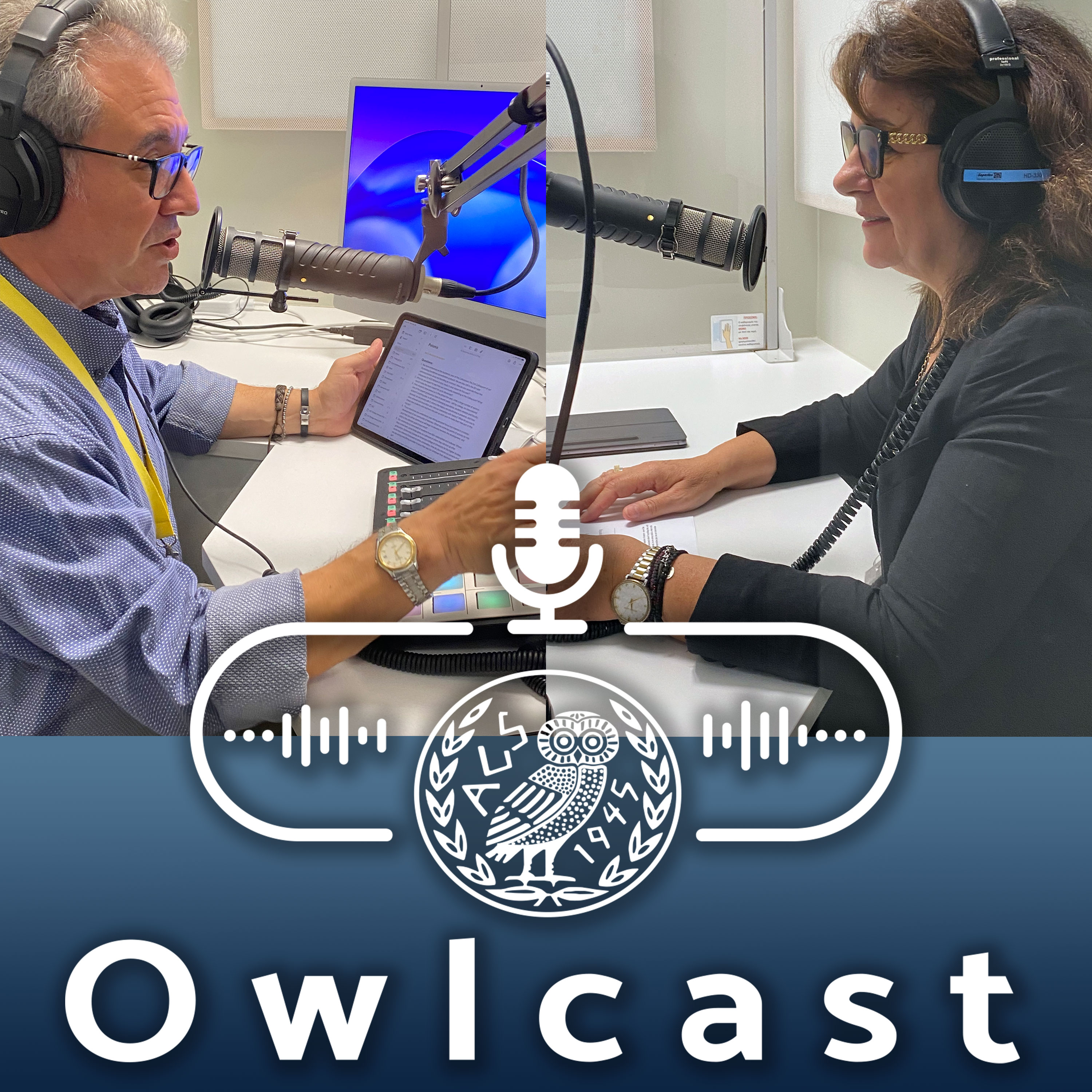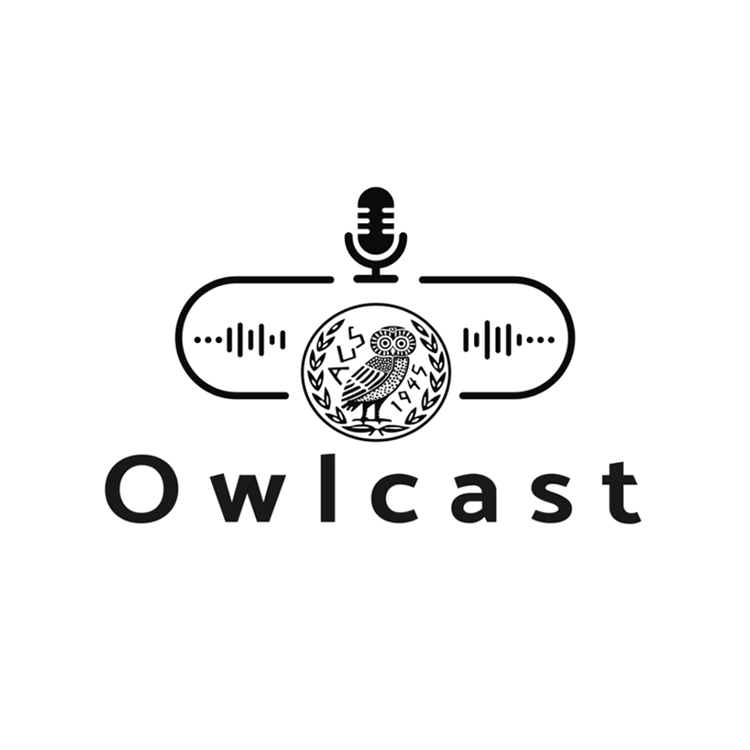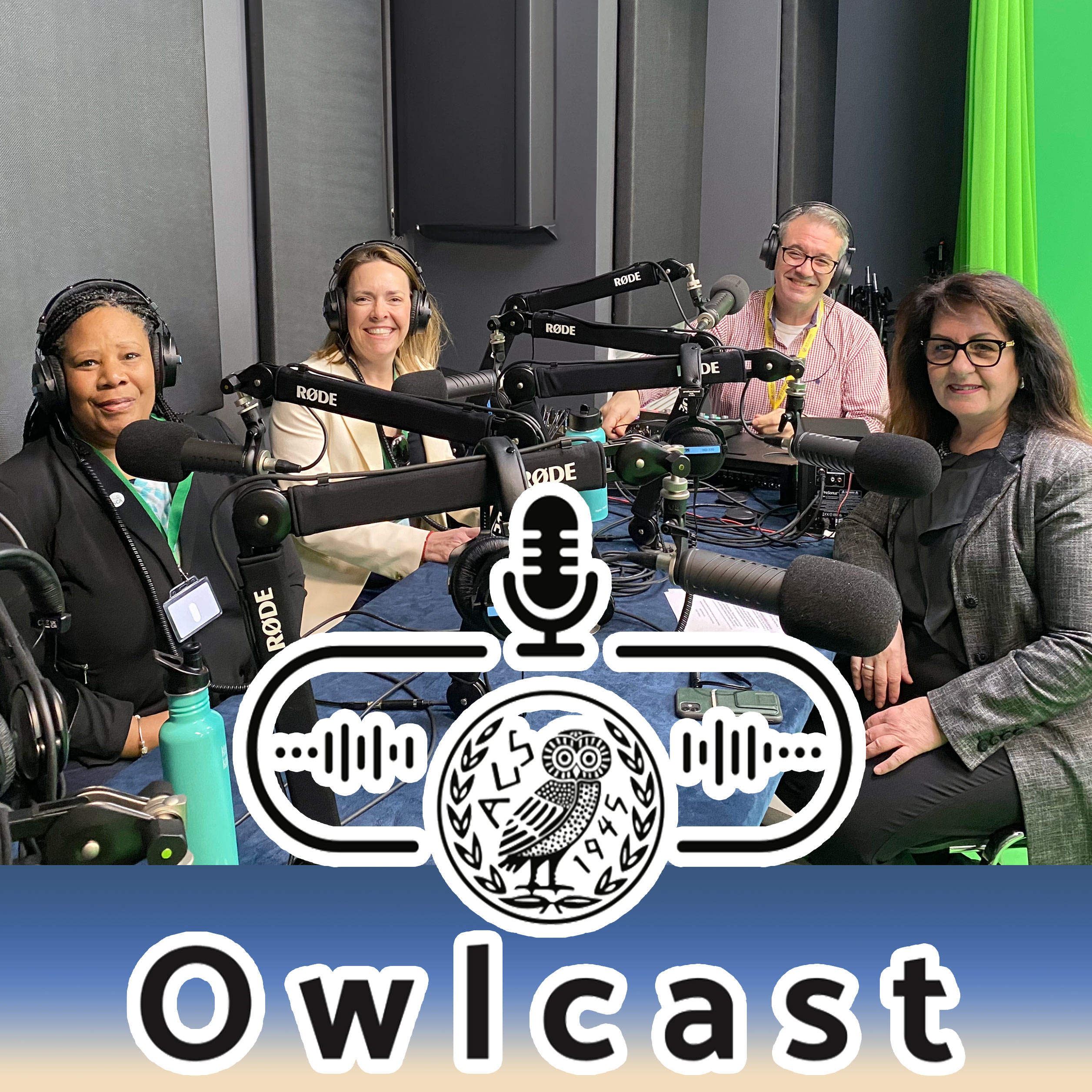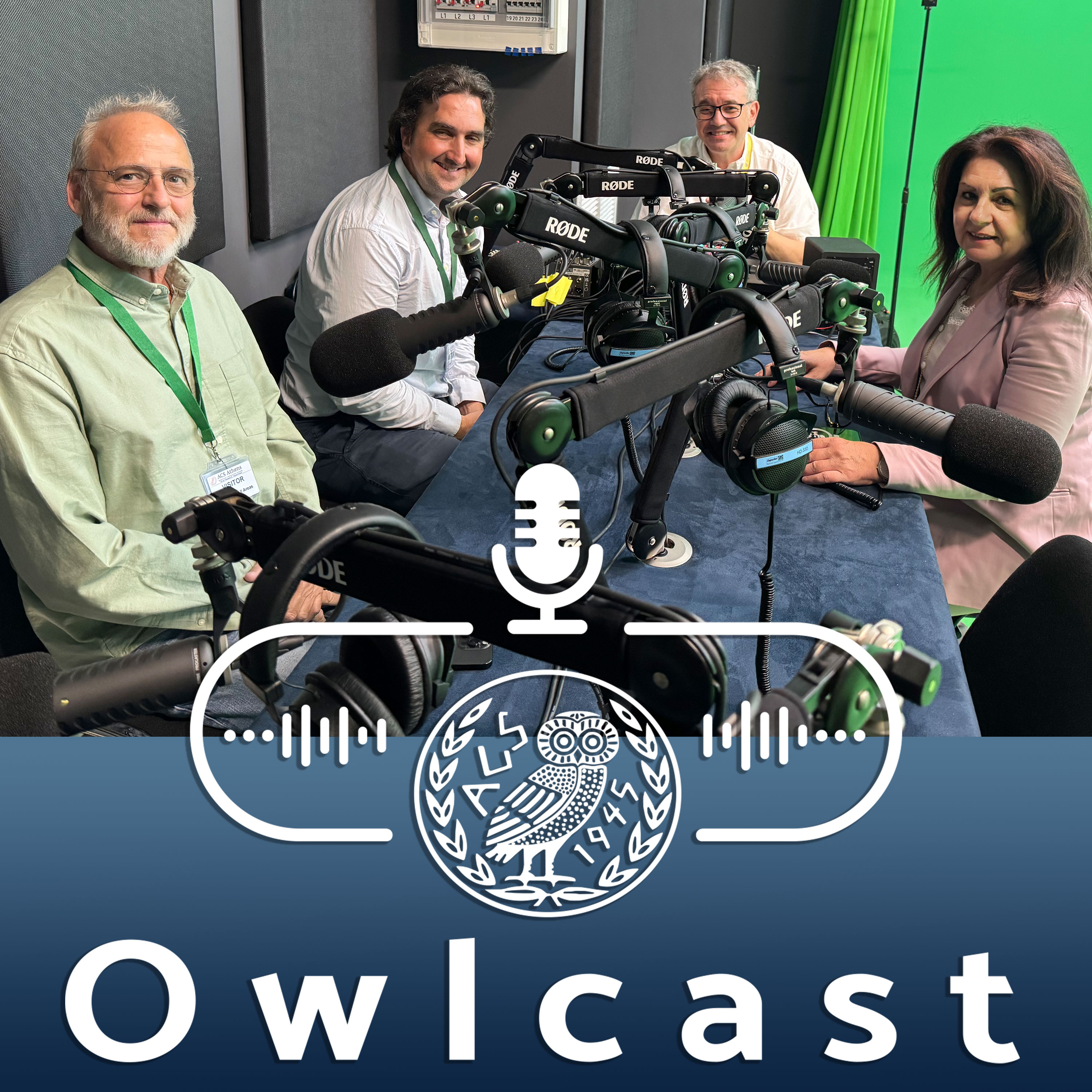Episode Transcript
[00:00:10] Speaker A: Welcome to the new season of owlcast, the official podcast of ACS Athens.
Owlcast is back for its fifth season and we're kicking things off with a conversation that sets the stage for an exciting year ahead.
In this premiere episode, as every year, we welcome the President of ACE Athens, Dr. Peggy Pelones. She reflects reflects on the dual milestones shaping the school community this year, the 80th anniversary celebration and the upcoming colloquium of the Sustaining Excellence Accreditation Protocol.
Together, these milestones capture the spirit of ACS Athens, honoring its history while envisioning a future grounded in innovation, reflection and growth.
Today's episode has insights in what makes the Colloquium such a unique event where faculty, staff and students all engage in action research and showcase learning that goes beyond the classroom. The President shares how this tradition of inquiry and discovery fuels professional development, inspires creativity and strengthens the school's mission of cultivating conscious, global citizens. The conversation highlights how new and returning members of the community enrich the school environment, blending legacy with fresh perspectives to create a dynamic, ever evolving institution.
This episode also takes on timely issues like responsible AI learning, holistic student development, and the ways ACS Athens prepares its students for success in diverse global contexts. From fostering resilience and empathy to amplifying student voice and interdisciplinary learning, our discussion underscores the school's commitment to shaping future leaders who can thrive anywhere in the world. It's a thoughtful and inspiring way to open Season five, an invitation to celebrate, reflect and move forward together. Here's our discussion with President Pelonis.
We have embarked on the academic year of the Colloquium, the second colloquium of our Sustaining Excellence Accreditation Protocol. Although we are still in the 80 year commemoration since our founding as a school, we want to reconcile these two milestones. What is in your mind? How do you approach these two big milestones in your vision for this academic year?
[00:02:44] Speaker B: Well, first of all, both milestones highlight the continuity of excellence.
The colloquium is a forward looking practice in self reflection and innovation and the 80th anniversary as a recognition of tradition and legacy. Now they present the dual role of ACS Athens, honoring history while setting a sustainable, excellence driven path for the future. So together they embody the school's mission of preparing students as conscious global citizens to improve life and living and reflecting on where we've come from while envisioning where we need to go.
This year is an opportunity to merge the celebration with responsibility, leveraging the wisdom of the 80 years to refine and to evolve through the accreditation journey. So I see it as an evolution, as a continuous moving forward, but combining, bringing forth all of the legacy, tradition, history of ACS Athens with innovation, with movement towards the future.
[00:03:50] Speaker A: So we have been part of the previous colloquium in 2016.
For someone who hasn't any idea what this colloquium is, why do we have a colloquium of showcasing certain stuff? How would you describe this process? How would you describe these two days coming up in April?
[00:04:14] Speaker B: It's a celebration of learning, in my mind, but really it's going to take the format of a conference. But imagine a conference where everyone in the school, because action research is part of our sustained excellence accreditation protocol, not only faculty, though, are engaged in action research, but also staff and some students as well.
Now, why is that important?
You know, if when we talk about being lifelong learners, we really need to be at the forefront of what education strives to achieve.
So what we learned, you know, we were being trained a few years back or many years back, depending on how old you are in the institution, may not always apply today. It has to evolve, it has to change. You know, the history stays the same, but it has to change. So therefore, how do you get an entire institution to continue to move forward? You do so by helping them individually and collectively examine the issues that they think they need to learn more about.
You look at best practice in the world, and then you implement or you change something in your classroom or in your area and then see what the results are. Is that making a difference? It's the best kind of professional development that anybody can achieve. So on that day, people are. Will be presenting those findings.
What have they been coming up with? How has this made a difference and how has this translated into better teaching and more importantly, into better learning?
[00:05:44] Speaker A: And it's going to be an increasingly stressful creativity between now and the colloquium. And I think that thinking back in the previous one, we would see teachers, but also parents who attended who didn't know what to expect. And at the end of the day, everybody had this smile of exploration and of discovery.
So everybody's looking forward to that.
So what do you expect to see from our community presenting at the colloquium? Do you have any glimpse. Do you have any.
Anything that is going to make a real impact in your mind that you would like to see?
[00:06:24] Speaker B: Yes, absolutely. First of all, yes, it's going to be increasingly, you know, people are going to be more anxious about it. But I think at the same time, what I see already is A kind of growing passion and excitement about what's to come and a, you know, excitement about sharing what they're doing. So what do I expect to see? First of all, I expect to see a lot of the things that are already taking place in the classroom. I expect to see evidence of authentic learning experiences that reflect ACS Athens mission and vision in action. A clear demonstration of innovation, creativity and the application of things like responsible AI learning. The model that we're now becoming more and more equipped with a showcasing of impact. How programs, projects or initiatives have tangibly shaped student growth and community life. And stories about global citizenship. How our students and our faculty connect learning to real life, world, ethical, social and environmental outcomes. So turning all this knowledge and skill into action, that's what education is about.
[00:07:33] Speaker A: So another year, another group of people joined our community. New students have joined us this year, while a large number of seniors, one of the largest graduating class of 2025, which was last year, left for college. An international school, if anything else like us, is all about a changing population, student rotation, faculty renewal, as we always talk about it. What is the legacy we are striving to preserve? And how does renewal and innovation play into our interaction with our own history? What do you say to these students and to the teachers who join us each year? Make them feel part this family?
[00:08:15] Speaker B: Yeah, first of all, I think the legacy. What's the legacy? A community that's rooted in values of excellence, integrity and conscious global citizenship. So the renewal ensures that innovation and diversity and new perspectives continuously enrich the ACS Athens story. So obviously, when new people come to the school, whether it's teachers or students or new families, it enriches our environment because they bring in new perspectives, new ideas, new experiences, all of these things. But yet you also have the people who have been in the school for a while and that really are grounded in the history and the legacy of ACS Athens.
So the new members, I hope, are reminded that they're not just joining a school, but they're becoming part of a living tradition of global thinkers and compassionate leaders.
And that's what we want to see in the world. Global compassionate leaders and thinkers, problem solvers, people who are able to go out there and say, okay, how can I solve this problem? And if it doesn't work this way, what else can I do? Who can I reach out to? What are my resources? But always having a problem solving mindset.
So by engaging in history while embracing innovation, ACS Athens, you know, I'd like to believe that we want to, we ensure that each new student and teacher contributes to shaping a future aligned with its enduring mission. So it's a combination of both. And stepping into that, of course, you know, it's like you step into the river. You never step into the same river twice. Right. So by coming in, you're changing things, but also you're also integrating many of the things that are already here, that are working well.
[00:09:50] Speaker A: And we always have alums of the school coming back to see the school, to walk through the grounds and, you know, reminisce and see people that they knew. Do you see them as the preservation of our legacy, or do you see them as people who can help us move forward into a new direction or new horizons? Horizons. Exactly.
[00:10:14] Speaker B: You know, I think the most exciting part about the alums is not only their successes, but the fact that they still want to share those stories with us and that they do come back and they want to talk to our current students, and they want to preserve that connection.
So that tells me that there's an emotional connection with the school and that the school has provided, but also continues to provide something that's very valuable to them. And so that's exciting for me. And it's very touching, actually, to hear these stories and how they connect them back to, you know, being at ACS.
[00:10:45] Speaker A: Athens, and especially when they connect with the existing students.
[00:10:48] Speaker B: That's amazing.
[00:10:49] Speaker A: As you see the connections like they are in the same frame of mind.
[00:10:53] Speaker B: Yes. And not only that, but all over the world. And that's, of course, part of what you're also doing, you know, being head of our global alumni is wanting to develop that network out there so that wherever they are, they find each other. And, you know, it's. Something magical happens when they say, oh, you went to aces. Oh, I'm from acs. Oh, and then they build on that.
But they have a common something in common that is very special to them and so certain. Certainly many of them have moved into the world in ways that they're successful. They have moved forward, innovation, business practices, entrepreneurship, humanities, in unexpected ways, in unexpected ways and have changed from one to the other. But the connecting piece remains Aces Athens soul. And the fact that they want to come back and share that is amazing. So I see the history embedded in every one of them, but at the same time, I see them as of the future changes and evolution of what's happening in the world.
[00:11:57] Speaker A: Those who know you understand your strong personal focus and interest in a holistic development of our community of learners. What are some key points of activity for this year that you either continue from the past one or you will begin to develop what is the ultimate goal in your mind.
[00:12:18] Speaker B: I believe strongly that holistic education and wellness is very important because, you know, when we feel good, when we fit, when we have high self esteem, when we have the courage to try new things, when we have social interest from that place of belonging and strength, we can do anything in the world. And so it's very important to develop these kinds of feelings and ways of being in students, because then I can trust that they will go out and do wonderful things and do things that fulfill them and have meaning for them. So I want to continue to integrate academic excellence with social, emotional learning, leadership opportunities, and ethical decision making. And so, as we expand these initiatives, we want to promote student agency, their voices, I want to hear their voices more and the choices that they have in this learning journey, because it's all about choices that they make. So I want to hear more about that. But also we want to enhance, continue to enhance interdisciplinary programs that connect stem, the arts, the humanities, and service learning. You know, we talk about critical thinking and problem solving, and certainly mathematics and science, you know, will help us become problem solvers. But what about the humanities, where we really analyze, where we really explore, where we explore what it means to be human? Because at a time of AI, one of the things that certainly keeps coming to the forefront is how do we amplify our humanity so that this is a tool that we continue to use to our advantage rather than, you know, allow it to take over. In addition to that, don't forget that ACS Athens developed in the 1970s the first humanities interdisciplinary course that asked the question, what makes us human? And to this day, this course is going strong. And in fact, it's one of the courses that many of our alums remember throughout the years as really being thought provoking. And so we want to continue to amplify that. And the ultimate goal is to nurture balanced individuals, reflective thinkers, empathic citizens, capable leaders that are prepared to thrive in a globally changing society.
[00:14:35] Speaker A: Well, you touched on it, but I want to follow up on this one because we've been talking about this for the past couple of years at least, but I think it's not going away. Quite the opposite. As a school, we are committed to develop our approach to learning through artificial intelligence. And for quite some time, we have been exploring, researching, discovering some of the ways that our community, faculty and students can use AI in responsible and ethical way. First of all, do you use AI? And secondly, how do you see Our path until now. Any particular points of reflection you'd like to share?
[00:15:11] Speaker B: The short answer is yes, of course. I use AI tools. Reflecting on the same philosophy we want to model for our students. It's very important that we do that. And so, you know, we want to be able to model responsible, ethical and purposeful engagement with it with technology.
So our path so far at a ACS has been about curiosity, it's been about research and collective exploration of AI's role in teaching and learning and in problem solving. And reflection is the key because it ensures that AI serves as an enhancer of human creativity and judgment and not a replacement. So moving forward, ACS Athens is positioned to model this model how AI can be used and can be integrated responsibly, aligned with, with the mission of the school and of course, in our case, with conscious global citizenship. So the more we learn about that and reflect on that, the more we're able to do that for ourselves and for our students.
[00:16:12] Speaker A: Have you had any discussions with either faculty or parents who had either questions or maybe concerns about the use of AI?
[00:16:21] Speaker B: Yes, I think the greatest concern is about plagiarism and people or AI being able to do the work for students and replacing their ability think and so on and so forth. And that that was in the beginning as we explored AI. But I think the more we get into AI and we learn to use it, the more creative we become, and so it can really become a partner in learning. I'm very amazed to see some of our faculty really advanced in these areas and using it to enhance their practice and to enhance teaching and as a result, learning. Parents, I think, also have some had some concerns, but again, the majority of our parents are out in the work, in the. Out there in corporations or whatnot, where AI is being used continuously. So they're becoming more and more familiar with what's possible.
Certainly as parents with any kind of technology, we have concerns, but I think if we develop, as we continue to develop this culture of ethical, responsible use and the parameters for that and the definitions for all of that, then we can teach our children to use it effectively and appropriately.
[00:17:36] Speaker A: So our community is comprised of students from over 60 nationalities and cultures.
Where they come from sometimes gives us a glimpse of where they will end up after graduation.
Some may choose an American college or university for their higher studies. Some may attend a European or other universities.
How do we assure our parents that we're doing everything possible to pave their way successfully for whatever their destination may be?
[00:18:05] Speaker B: Yeah, I think there's a reason why people choose to come to ACS Athens. You know, if it's a fit, it's a good fit. Then I think for the most part, they trust the process. But how do we assure them by, you know, maintaining a commitment to rigorous academic standards while fostering at the same time skills of adaptability, the critical thinking that I mentioned, and intellectual competence. But there's also some personalized college counseling that's supports the diverse aspirations. We have wonderful counselors that are experts in their field. A couple of them are new this year from great places in the US And Europe.
They have diverse expertise in both European universities, other universities, in global institutions.
But we also are demonstrating to parents how ACS Athens equip students not only for college admission, which is great, but for success in varied cultural and professional contexts. And in fact, you know this better than I do that our alums, one of the things that they tell us is that they really feel comfortable anywhere in the world. They don't necessarily stick to the group that when they go to college, they don't stick to the group that they went to college with, but they are able to make friends from diverse cultures and feel comfortable anywhere due to the experience that they had at ACS Athens. So there's an assurance that no matter the destination, the foundation of ACS Athens, the holistic development, the conscious citizenship remains strong and it is a transferable asset. And that's very important. They can take what they learn here and take it out into the world and it works for them.
[00:19:49] Speaker A: And I think that's what stays with the students when they come and they meet with alums who come and visit, because that's what they aspire to be, you know, global citizens. The mentality is what we cultivate, but also the personal skills that you just mentioned. Dr. Pelonis, thank you so much for the first episode of the fifth season of the Owlcast. And we'll see you around the campus and definitely at the colloquium.
[00:20:14] Speaker B: Thank you, Mr. Vapadakis. I look forward to it.
You are listening to the Owlcast, the official podcast of ACS Athens.
Make sure you subscribe to the Owlcast on Google Podcasts, Spotify and Apple Podcasts. This has been a production of the ACS Athens Media Studio.



